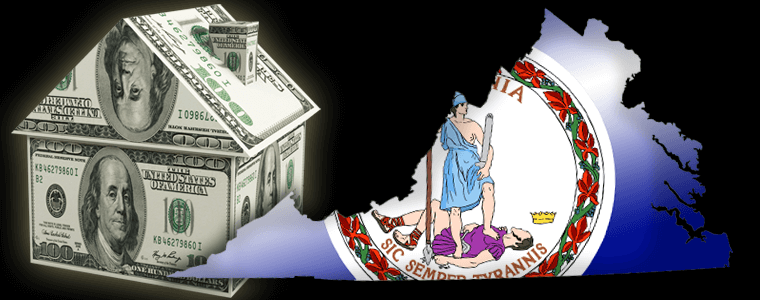By John Lee
In 1977, Virginia increased their Homestead Exemption from $3,500.0 to $5,000.00. Thirty-Seven years later, in 2014, the Homestead Exemption is still only $5,000.00. Five thousand dollars in 1977 would have the same buying power as $19,637.52 in 2014 dollars. In other words, Virginia’s law makers have robbed $14,639.52 worth of Homestead Exemption from already financially strapped Virginians over the last 37 years by refusing to update the exemption law in a meaningful way.
It is true that Virginia law makers have looked out for some folks and raised the Homestead Exemption for some special classes, like the elderly, but that does not even come close to what other States have done. Virginia also recognizes a Tenants by the Entirety for married couples. If you qualify for a Tenants by the Entirety exemption you may be able to protect all of the equity in your home.
Virginia has one of the lowest Homestead Exemptions in the nation. Virginia’s Homestead exemption is $5,000.00 per lifetime. Unlike other states, Virginians must also use that once per lifetime exemption to protect their bank accounts, life insurance, tax refunds, and more. That means if you use the full $5,000.00 Homestead Exemption protecting your tax refund, or bank account, then you cannot use that Homestead Exemption to protect your home or use it in a subsequent bankruptcy. It is an unfortunate fact that certain people find themselves in need of filing bankruptcy more than once in their lifetime. These people run the risk of loosing their bank accounts, tax refunds and homes when filing a second bankruptcy.
With a few narrow exceptions, Virginia allows debtors a once-in-a-lifetime Homestead Exemption of $5,000.00. This exemption must be recorded in the Circuit Court with the land records. The Homestead Exemption is also used to protect miscellaneous items like tax refunds, bank accounts, and other property. That means if you use $2,500.00 of the exemption to protect your life insurance policy, tax refund and bank account, then you only have $2,500.00 left to protect the equity in your home. The average house in Virginia cost about $200,000.00 and the State Legislature will only allow you to protect, at a maximum, (if you even qualify to use the maximum) $5,000.00 of the equity in your home.
How does Virginia’s Homestead exemption stack up against other State’s exemptions? Massachusetts has a $500,000.00 Homestead Exemption. Arizona has a $150,000.00 Homestead Exemption. Minnesota has up to a $975,000.00 Homestead Exemption. New York has a $150,000.00 Homestead Exemption. Montana has a $250,000.00 Homestead Exemption. When you average all the Homestead Exemptions together; the average Homestead Exemption from around the country is nearly $100,000.00. At a measly $5,000.00, why is Virginia’s Homestead exemption 95% lower than the national average?
I have a couple of proposals for Virginia Lawmakers. First, immediately raise the Homestead Exemption back to what it was in 1977, which, when adjusted for inflation, is $19,637.52. That is doing nothing more than giving people back what was taken from them through inflation. There can be no serious argument that raising the Homestead Exemption back to where it was in 1977 could damage creditors or the economy. After giving back the Homestead Exemption that was taken from the people though inflation, then index the Homestead for future inflation so that we don’t have this problem again.
Secondly, and this will require real courage on the part of our law makers, bring Virginia out of the Dark Ages, and raise our Homestead Exemption to the average level of the other States. I’m not suggesting that Virginia excel or be better than the other States, just that we not be in the bottom 95% of States when it comes to protecting the most vulnerable citizens with Homestead Exemptions. I suggest that Virginia raise their Homestead Exemption to the national average, somewhere around $100,000.00.
It’s time for Virginia Law Makers to put away their disco balls, bellbottom pants and step out of the 1970s. We need lawmakers to stop cowering to debt collectors and credit card companies; and, at the very minimum, not take away the value of the honest debtor’s exemptions through refusing to update the laws in the face of inflation.
On January 14, 2015, Statesman Scott Surovell introduced legislation that if passed, would significantly increase the exemptions a Virginia debtor may claim. House Bill 2015 proposes, in part, to allow the debtor to claim federal exemptions under section 522 (d). This would increase the debtor’s homestead/wildcard exemption to over $20,000.00. The bill would allow the debtor to use his automobile exemption on more than one car; exempt spousal support; allow the debtor to exempt more than one firearm; and allow the debtor to exempt any earned income tax credit he or she may receive. I hope the Virginia legislature has the courage to bring Virginia’s exemptions laws out of the 1970’s and up to par with the rest of the nation. Thank you Scott Surovell for bringing attention to this very important issue that the Virginia Legislature has ignored for decades.
This blog may be considered advertising material.


